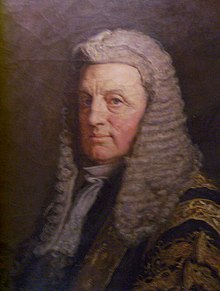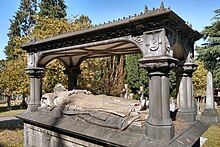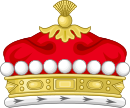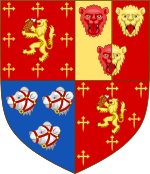| The Right HonourableThe Viscount EsherPC | |
|---|---|
 Lord Esher by John Everett Millais. Lord Esher by John Everett Millais. | |
| Solicitor-General | |
| In office 10 February 1868 – 16 September 1868 | |
| Monarch | Victoria |
| Prime Minister | Benjamin Disraeli |
| Preceded by | Sir Charles Jasper Selwyn |
| Succeeded by | Sir Richard Baggallay |
| Master of the Rolls | |
| In office April 1883 – 1897 | |
| Monarch | Victoria |
| Preceded by | Sir George Jessel |
| Succeeded by | Sir Nathaniel Lindley |
| Personal details | |
| Born | 13 August 1815 (1815-08-13) |
| Died | 24 May 1899 (1899-05-25) (aged 83) London, England |
| Nationality | British |
| Political party | Conservative |
| Spouse | Eugénie Mayer |
| Children | 3, including Reginald |
| Alma mater | King's College London Caius College, Cambridge |
William Baliol Brett, 1st Viscount Esher, PC (13 August 1815 – 24 May 1899), known as Sir William Brett between 1868 and 1883, was a British lawyer, judge, and Conservative politician. He was briefly Solicitor-General under Benjamin Disraeli and then served as a justice of the Court of Common Pleas between 1868 and 1876, as a Lord Justice of Appeal between 1876 and 1883 and as Master of the Rolls. He was raised to the peerage as Baron Esher in 1885 and further honoured when he was made Viscount Esher on his retirement in 1897.
Background and education
Brett was a son of the Reverend Joseph George Brett, of Chelsea, London, by Dorothy, daughter of George Best, of Chilston Park, Boughton Malherbe, Kent. He was educated at Westminster School, King's College London and at Gonville and Caius College, Cambridge. Brett rowed for Cambridge University Boat Club against Leander Club in 1837 and 1838, then in the victorious Cambridge crew against Oxford University in the 1839 Boat Race.
Career
Called to the Bar in 1840, Brett went to the northern circuit and became a Queen's Counsel in 1861. On the death of Richard Cobden in 1865, he unsuccessfully contested Rochdale as a Conservative, but in an 1866 by-election, he was returned for Helston in unique circumstances. He and his opponent polled exactly the same number of votes, and the mayor, as returning officer, then gave his casting vote for the Liberal candidate. As the vote was given after four o'clock, however, an appeal was lodged, and the House of Commons allowed both members to take their seats.
Brett rapidly made his mark in the House, and in early 1868, he was knighted and appointed Solicitor General under Benjamin Disraeli. On behalf of the Crown, he prosecuted the Fenians charged with having caused the Clerkenwell Outrage. In Parliament, he took a leading part in the promotion of bills connected with the administration of law and justice. In August 1868, he was appointed a Justice of the Court of Common Pleas. Some of his sentences in this capacity excited much criticism, notably so in the case of the gas stokers strike, when he sentenced the defendants to imprisonment for twelve months, with hard labour, which was afterwards reduced by the Home Secretary to four months.
On the reconstitution of the Court of Appeal in 1876, Brett was elevated to the rank of a Lord Justice of Appeal. He was sworn of the Privy Council at the same time. After holding the position for seven years, he succeeded Sir George Jessel as Master of the Rolls in 1883. In 1885 he was raised to the peerage as Baron Esher, of Esher in the County of Surrey. He opposed the bill proposing that an accused person or his wife might give evidence in their own case and supported the bill that empowered Lords of Appeal to sit and vote after their retirement. The Solicitors Act 1888, which increased the powers of the Incorporated Law Society, owed much to his influence. In 1880, he delivered a speech in the House of Lords, deprecating the delay and expense of trials, which he regarded as having been increased by the Judicature Act 1873. He retired from the bench at the close of 1897, and was created Viscount Esher, of Esher in the County of Surrey, a dignity rarely given to any judge, Lord Chancellors excepted.
Judgments
- Tamplin v James (1880) 15 Ch D 215 (CA), upholding a decision of Baggallay LJ in the first instance; contract law concerning the availability of specific performance for a breach of contract induced by mistake.
- Compagnie Financiere du Pacifique v Peruvian Guano Co (1882) 11 QBD 55 - Established the modern test for discovery of documents.
- Heaven v Pender (1883) - In the obiter dicta in his judgment of the Court of Appeal, Brett MR sought to establish a general "duty of care" between parties that would have led to a tort of negligence. Such a principle was only finally accepted by English courts in 1932.
- Foakes v Beer (Brett sitting in the Court of Appeal) UKHL 1, All ER Rep 106, (1884) 9 App Cas 605; 54 LJQB 130; 51 LT 833; 33 WR 233 - a leading case from the House of Lords on the legal concept of consideration
- In the Arbitration between Secretary of State for Home Department and Fletcher (1887) - upholding a Queens bench decision supporting the authority of the Inspector of Mines to require the use of safety lamps; Bowen LJ dissenting.
- Filburn v People's Palace and Aquarium Co Ltd (1890) was a case that imposed strict liability upon owners of wild animals for harm caused by them.
- British South Africa Co v Companhia de Moçambique AC 602 (Esher sitting in the Court of Appeal) - Esher dissented from the Court of Appeal decision of Fry LJ and Lopes LJ; the House of Lords overturned their decision and by so doing established the Mozambique rule, a common law rule in private international law that renders actions relating to title in foreign land, the right to possession of foreign land, and trespass to foreign land non-justiciable in common law jurisdictions.
- The Satanita AC 59 - Contract law case atypical of the conventional offer & acceptance pattern seen in English law. Brett's decision at appeal affirmed by the House of Lords.
- Chatenay v Brazilian Submarine Telegraph Company Ltd QB 79 - choice of law in relation to transactions under foreign powers of attorney
Family

Lord Esher married Eugénie Mayer (1814–1904) in 1850. She was the daughter of Finette and Lazare Mayer, and the step-daughter of Lt Col John Gurwood, the editor of Wellington's Dispatches. They had two sons, Reginald, and Eugène, and a daughter Violet, wife of William Humble Dudley Ward and mother of William Dudley Ward. Lord Esher died in London in May 1899, aged eighty-three, and was succeeded by his eldest son, Reginald.
Arms
See also
References
- "Esher, Viscount (UK, 1897)". Archived from the original on 6 June 2014.
- "Brett, William Baliol (BRT835WB)". A Cambridge Alumni Database. University of Cambridge.
- Woodgate, Walter Bradford (1888). Boating. London: Longmans, Green, and Co. pp. 255–256. Retrieved 25 July 2011.
- ^
 One or more of the preceding sentences incorporates text from a publication now in the public domain: Chisholm, Hugh, ed. (1911). "Esher, William Baliol Brett, 1st Viscount". Encyclopædia Britannica. Vol. 9 (11th ed.). Cambridge University Press. p. 768.
One or more of the preceding sentences incorporates text from a publication now in the public domain: Chisholm, Hugh, ed. (1911). "Esher, William Baliol Brett, 1st Viscount". Encyclopædia Britannica. Vol. 9 (11th ed.). Cambridge University Press. p. 768.
- "No. 22483". The London Gazette. 26 February 1861. p. 792.
- "No. 23359". The London Gazette. 6 March 1868. p. 1519.
- "No. 23417". The London Gazette. 28 August 1868. p. 4733.
- "No. 24389". The London Gazette. 1 December 1876. p. 6673.
- "No. 25218". The London Gazette. 3 April 1883. p. 1777.
- "No. 25493". The London Gazette. 1 December 1885. p. 3426.
- "No. 26910". The London Gazette. 12 November 1897. p. 6227.
- "Contract - General Principles - Remedies - Specific Performance and Injunctions - Specific Performance". The Laws of Australia. 31 August 2006. pp. .
- *Lunney, M. & Oliphant, K. (2003). Tort Law:Text and Materials (2nd ed.). Oxford: Oxford University Press. pp. pp91–91. ISBN 0-19-926055-9.
- The Law Reports, Queens Bench Division (1887). "In the Arbitration between Secretary of State for Home Department and Fletcher". XVIII: 340–346.
{{cite journal}}: Cite journal requires|journal=(help) - Henderson, J.A. et al. The Torts Process, Seventh Edition. Aspen Publishers, New York, NY: 2007, p. 424
- "Report 63 (1988) – Jurisdiction of Local Courts Over Foreign Land". Law Reform Commission, New South Wales. 30 May 2001. Retrieved 1 September 2008.
{{cite journal}}: Cite journal requires|journal=(help) - ^ Hedley, S. (2004) "Brett, William Baliol, first Viscount Esher (1815–1899)", Oxford Dictionary of National Biography, Oxford University Press, accessed 20 November 2007 (subscription or UK public library membership required)
- Burke's Peerage. 1914.
External links
| Parliament of the United Kingdom | ||
|---|---|---|
| Preceded byRobert Campbell | Member of Parliament for Helston 1866 – 1868 |
Succeeded byAdolphus William Young |
| Legal offices | ||
| Preceded bySir Charles Jasper Selwyn | Solicitor General February 1868 – September 1868 |
Succeeded bySir Richard Baggallay |
| Preceded bySir George Jessel | Master of the Rolls 1883 – 1897 |
Succeeded bySir Nathaniel Lindley |
| Peerage of the United Kingdom | ||
| New creation | Viscount Esher 1897–1899 |
Succeeded byReginald Brett |
| Baron Esher 1885–1899 | ||
- 1815 births
- 1899 deaths
- People educated at Westminster School, London
- Alumni of Gonville and Caius College, Cambridge
- Cambridge University Boat Club rowers
- British male rowers
- 19th-century English judges
- Members of the Privy Council of the United Kingdom
- UK MPs 1865–1868
- UK MPs who were granted peerages
- Conservative Party (UK) MPs for English constituencies
- Viscounts in the Peerage of the United Kingdom
- Solicitors general for England and Wales
- Masters of the Rolls
- Justices of the Common Pleas
- Knights Bachelor
- Common Pleas Division judges
- Members of the Parliament of the United Kingdom for Helston
- Peers of the United Kingdom created by Queen Victoria


